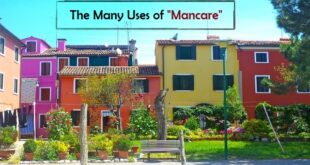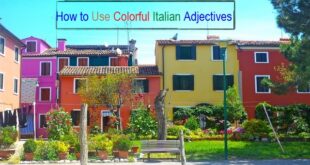The Italian Family of Yesterday and Today Traditionally, married couples in Italy had large families and raised their children as part of an extended family of aunts, uncles, and cousins. In modern Italy, nuclear families tend to be smaller, but the language for how to describe children as they grow from a baby to an adult has not changed very much. Young boys and girls are called “the baby” — with “il bambino” for young boys or “la bambina” for young girls — until 5 or 6 years, long after we Americans would consider the “baby stage” has been completed. …
Read More »The many uses of mancare
The Italian verb mancare has many meanings: to miss (someone)/to need (something)/to lose/to lack/to be lacking/to omit/to fail and can even be used as a euphemism for to die. Perhaps the most common way Italians use the verb mancare is to convey the idea of “to miss someone,” which was discussed in detail in a previous blog in this series, ” ‘Missing You’ with Mancare” In the prior blog, the conjugation of mancare and the use of indefinite object pronouns needed to convey the idea of “missing someone” was discussed in detail. With this blog, we will now focus on the …
Read More »Familiar Italian commands
About Italian Command Verbs To speak fluently in another language, it is important to understand the nuances used among family members and friends. In Italian, verbs in their familiar imperative form are commonly used, especially with children, to give encouragement, instructions, or warnings. In many cases, a familiar imperative verb can stand alone as a complete expression. To the English speaker, the grammatical name “imperative verb,” or its alternate “command verb,” can suggest a harsh approach to interacting with others; we English speakers typically think of a command as a type of forceful instruction given by an officer in the …
Read More »Italian linking verbs
Italian Linking Verb Essere “To be, or not to be…” is one of the most famous lines ever written in the English language. But that phrase would not be possible without a verb to express the very idea that we exist. Think of how many times a day we say, “I am” or “he is” or “we are” — all forms of the English infinitive verb “to be.” In Italian, the verb essere means to be. Essere in the present tense is a linking verb, as it connects the subject in the beginning of the sentence with specific information …
Read More »Possessive adjectives
Italian Possessive Adjectives for Things Possessive adjectives allow one to describe ownership. Did you know that to describe possession in English, we simply put a possessive adjective (my, your, his/hers, etc.) before a noun under discussion? The word placement is the same in Italian. But there are otherwise many differences in the English and Italian approach to describing our relationship to the things we own. In English, the possessive adjectives refer to the person who is the “owner” of the thing being talked about. However, the Italian use of possessive adjectives requires a different way of thinking, since Italians match …
Read More »Adding color with adjectives
To speak fluently in another language, it is important to know how to describe the characteristics of the people, places, and things that we encounter every day. Adjectives can enliven the listener’s perception of a subject and provide additional shades of meaning. In English, adjectives are generally placed before the noun. But in Italian, most adjectives are placed after the noun the modify, while a few groups of adjectives are placed before the noun. And finally, many Italian adjectives can hold either position in relation to their noun — either before or after. Interestingly, where an Italian adjective is placed in …
Read More »Getting there with “a” and “in”
Use the Italian “in” for Italian Regions Both Italian prepositions “a” and “in” can be used to describe where someone is going, as well as their destination when they arrive. The Italian “a” can be translated as both “to” or “in” in English. The Italian “in” is translated the same as in English — “in”! In simple terms, Italian prepositions are linked to the place that they describe. We’ve already learned the basics of how to use the Italian prepositions a and in in our first blog on this topic, Italian Preposition “A” or “In”? The general rule, stated again, …
Read More »Being polite with “volere”
The Italian Verb Volere Volere means “to want” or “to desire,” and is classified as a modal, or helping verb. This means that volere provides information about one’s wish or intention to complete the main action described in a sentence. When used in this way, volere is conjugated to reflect the speaker and the action verb follows directly after in its infinitive form — that is, the action verb is not conjugated! (Remember that Italian verbs are categorized into three infinitive forms by the following endings: -are, -ere, and -ire, and that English infinitive verbs are preceded by “to,” as in, …
Read More »An Italian Valentine’s Day
Over the centuries, writers have pondered the question, “Che cos’è l’amore?” “What is love?” And since the Italian poet Petrarch expressed his great love for Laura in the 14th century, love poems have often taken the form of he used — the sonetto, or sonnet. These “little songs” are 14 lines long and follow a specific rhythm and rhyme scheme. When Shakespeare took up the sonnet in the 16th Century, he changed Petrarch’s form and made it his own; Shakespeare used the sonnet to write some of the most famous lines about love in existence today. Shakespeare’s contemporaries and many poets who …
Read More »Equivalent Comparisons
Every day, we all compare the characteristics of one person, place or thing to another — and many times these characteristics are similar or the same. For instance, there are so many places in Italy that are beautiful, and one may be as beautiful as another! Or one place in Italy may have as many important sites of interest as another. In these cases, to make a comparison we must use the Italian adverbs come and tanto… quanto to relay the meanings “as,” “as well as,” and “as much as.” When comparing two different nouns — people, places, or things …
Read More » Fra Noi Embrace Your Inner Italian
Fra Noi Embrace Your Inner Italian











